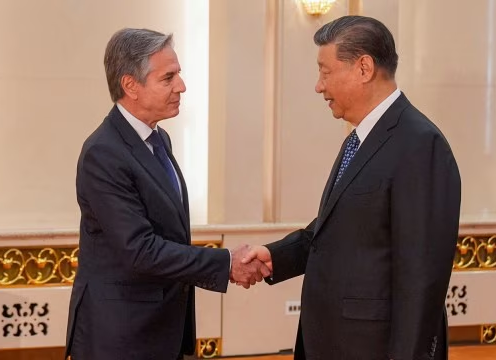During a visit to Beijing on Friday afternoon, US Secretary of State Antony Blinken claimed that the United States was considering introducing measures to influence growing Russian-Chinese economic co-operation as it could exacerbate the situation in Ukraine, according to The Guardian.
Chinese leader Xi Jinping stated that the US most important diplomatic issues remained on the bilateral agenda as the world’s largest economies held talks aimed at resolving sharp disputes over trade and China’s continued support for Russia.
China and the United States should be partners rather than rivals. We’re committed to maintaining and strengthening lines of communication.
On Thursday, April 25, NATO Secretary General Jens Stoltenberg declared that China should stop backing Russia’s war in Ukraine if it wanted to have good relations with the West, according to Reuters.
“In the past, we made the mistake of becoming dependent on Russian oil and gas. We must not repeat that mistake with China. Depending on its money, its raw materials, its technologies – dependencies make us vulnerable.”
During his three-day visit, Blinken first stopped in Shanghai to meet with students and attend a basketball game. US sanctions against Chinese companies involved in China-Russia trade were also on the agenda, Bloomberg reported.
A senior US administration official noted that the measures would target “individuals who are taking steps in contravention of our interests and in ways that severely undermine security in both Ukraine and Europe.”
We’re committed to taking the steps necessary to defend our national interests. This will be a key issue of discussion while we’re in Beijing.
Earlier this week, G7 foreign ministers issued a strong statement declaring that “China should ensure that this support for Russia stops.”
On Thursday, Chinese defence ministry spokesman Wu Qian stated that Beijing intended to respond with strong measures to the US deployment of intermediate missiles in the Philippines.
“We resolutely oppose the US move to deploy intermediate-range ballistic missiles in the Asia-Pacific. Our position has been clear and consistent. US steps are posing a major threat to security and stability of regional players and will inevitably prompt a decisive response from China.”
The defence ministry’s statements came as the US Army announced plans to deploy medium-range missiles in Asia to deter China. According to Gibbs & Cox, the refitted oil platforms could support air defence or strike missions with five times the power of the US Navy Arleigh Burke-class destroyer.
The move also aims to support surface warships and nuclear submarines through an Afloat Forward Staging Base configuration, which could exacerbate an already tense situation in the region.
